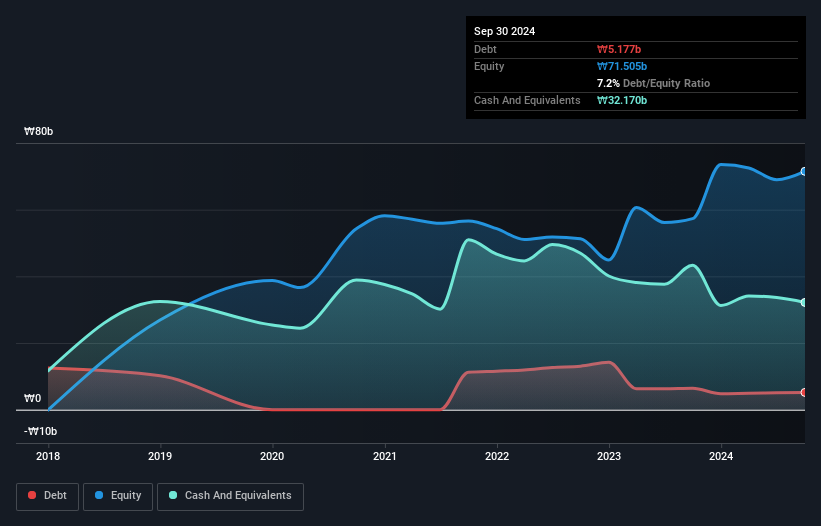- South Korea
- /
- Software
- /
- KOSDAQ:A304100
Saltlux (KOSDAQ:304100) Has Debt But No Earnings; Should You Worry?
Warren Buffett famously said, 'Volatility is far from synonymous with risk.' So it might be obvious that you need to consider debt, when you think about how risky any given stock is, because too much debt can sink a company. Importantly, Saltlux Inc. (KOSDAQ:304100) does carry debt. But is this debt a concern to shareholders?
Why Does Debt Bring Risk?
Debt and other liabilities become risky for a business when it cannot easily fulfill those obligations, either with free cash flow or by raising capital at an attractive price. Ultimately, if the company can't fulfill its legal obligations to repay debt, shareholders could walk away with nothing. However, a more usual (but still expensive) situation is where a company must dilute shareholders at a cheap share price simply to get debt under control. Of course, plenty of companies use debt to fund growth, without any negative consequences. The first thing to do when considering how much debt a business uses is to look at its cash and debt together.
View our latest analysis for Saltlux
How Much Debt Does Saltlux Carry?
As you can see below, Saltlux had ₩5.18b of debt at September 2024, down from ₩6.42b a year prior. However, it does have ₩32.2b in cash offsetting this, leading to net cash of ₩27.0b.

How Healthy Is Saltlux's Balance Sheet?
According to the last reported balance sheet, Saltlux had liabilities of ₩10.2b due within 12 months, and liabilities of ₩14.5b due beyond 12 months. Offsetting this, it had ₩32.2b in cash and ₩3.96b in receivables that were due within 12 months. So it actually has ₩11.4b more liquid assets than total liabilities.
This surplus suggests that Saltlux has a conservative balance sheet, and could probably eliminate its debt without much difficulty. Simply put, the fact that Saltlux has more cash than debt is arguably a good indication that it can manage its debt safely. When analysing debt levels, the balance sheet is the obvious place to start. But it is Saltlux's earnings that will influence how the balance sheet holds up in the future. So when considering debt, it's definitely worth looking at the earnings trend. Click here for an interactive snapshot.
In the last year Saltlux wasn't profitable at an EBIT level, but managed to grow its revenue by 81%, to ₩50b. Shareholders probably have their fingers crossed that it can grow its way to profits.
So How Risky Is Saltlux?
Statistically speaking companies that lose money are riskier than those that make money. And we do note that Saltlux had an earnings before interest and tax (EBIT) loss, over the last year. And over the same period it saw negative free cash outflow of ₩8.4b and booked a ₩3.3b accounting loss. While this does make the company a bit risky, it's important to remember it has net cash of ₩27.0b. That means it could keep spending at its current rate for more than two years. With very solid revenue growth in the last year, Saltlux may be on a path to profitability. By investing before those profits, shareholders take on more risk in the hope of bigger rewards. The balance sheet is clearly the area to focus on when you are analysing debt. However, not all investment risk resides within the balance sheet - far from it. To that end, you should be aware of the 2 warning signs we've spotted with Saltlux .
Of course, if you're the type of investor who prefers buying stocks without the burden of debt, then don't hesitate to discover our exclusive list of net cash growth stocks, today.
New: Manage All Your Stock Portfolios in One Place
We've created the ultimate portfolio companion for stock investors, and it's free.
• Connect an unlimited number of Portfolios and see your total in one currency
• Be alerted to new Warning Signs or Risks via email or mobile
• Track the Fair Value of your stocks
Have feedback on this article? Concerned about the content? Get in touch with us directly. Alternatively, email editorial-team (at) simplywallst.com.
This article by Simply Wall St is general in nature. We provide commentary based on historical data and analyst forecasts only using an unbiased methodology and our articles are not intended to be financial advice. It does not constitute a recommendation to buy or sell any stock, and does not take account of your objectives, or your financial situation. We aim to bring you long-term focused analysis driven by fundamental data. Note that our analysis may not factor in the latest price-sensitive company announcements or qualitative material. Simply Wall St has no position in any stocks mentioned.
About KOSDAQ:A304100
Saltlux
Operates as machine learning and natural language processing in South Korea.
Excellent balance sheet with minimal risk.
Market Insights
Community Narratives



